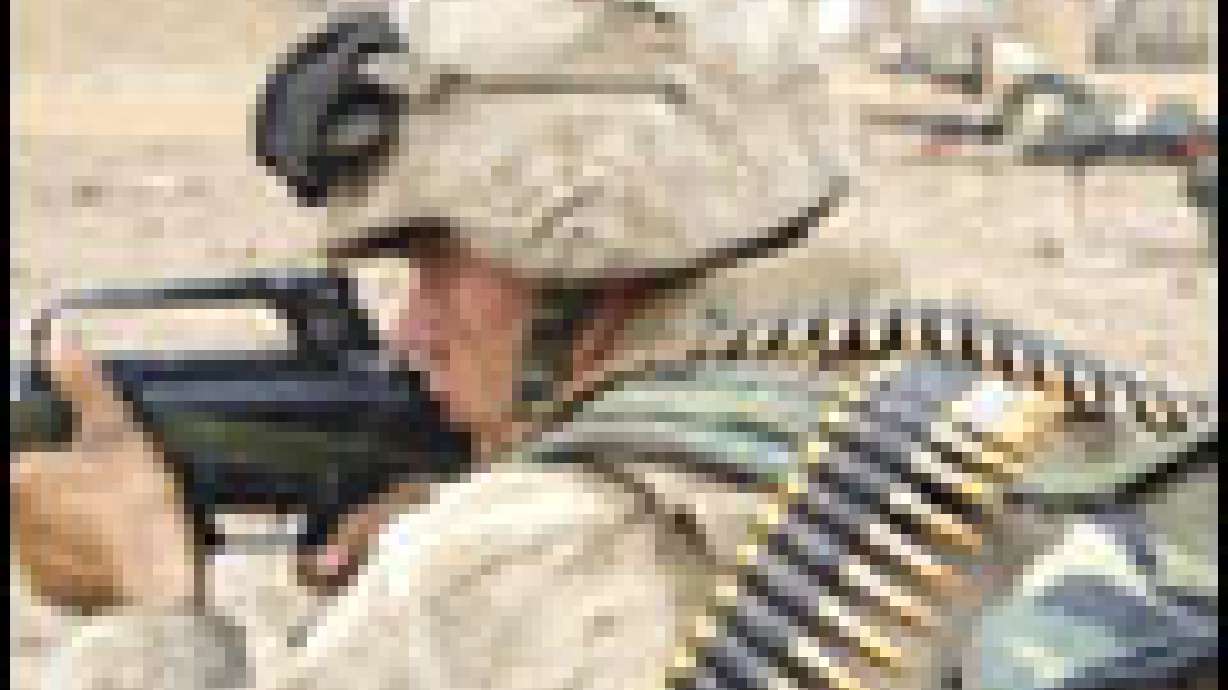Estimated read time: 4-5 minutes
This archived news story is available only for your personal, non-commercial use. Information in the story may be outdated or superseded by additional information. Reading or replaying the story in its archived form does not constitute a republication of the story.
(AP) U.S.-led forces expanded their control over Iraq on Friday as Mosul, largest city in the north, fell without a fight. Saddam Hussein and his sons are "either dead or they're running like hell," said Gen. Tommy Franks, top commander of a war nearly won.
Looting swiftly erupted in Mosul -- hospital ambulances were taken at gunpoint -- and lawlessness continued to plague Baghdad three days after the collapse of the regime. Increasingly, U.S. troops in the capital turned their efforts to restoring order, although pockets of resistance and suicide bombers remained constant threats.
Mosul fell when an entire Iraqi Army Corps evaporated, a force of roughly 30,000 on paper but far less in practice. That left Tikrit, Saddam's hometown, as the only major population center not under control of American-led forces.
Whatever combat lay ahead there or elsewhere, Defense Secretary Donald H. Rumsfeld said it was increasingly clear that most Iraqis "welcome American and British forces and see them not as invaders or occupiers but as liberators."
Saddam's whereabouts remained unknown. Nor have American or British forces been able to find his two sons or other key leaders of the regime that ruled for almost a quarter century.
The U.S. Central Command issued a deck of 55 cards, each one bearing the picture of a member of the ruling elite so the troops could better know who they were searching for. "There are jokers in this deck," Brig. Gen. Vincent Brooks said, and Saddam was the ace of spades.
Despite a string of unchecked battlefield gains, and an announcement that some British naval and air forces were being sent home, the White House and military commanders said the war wasn't over.
"There's still plenty of fighting to be done," said Lt. Gen. William S. Wallace. In Baghdad, he said, the problem lies with the "knuckleheads ... operating and fighting on the last orders they were given. They either don't know what is going on or are feeling obligated to keep fighting on."
U.S. warplanes fired six satellite-guided bombs at an intelligence building in Ramadi, 60 miles west of Baghdad, in a predawn attack. Officials said they believed Brazan Ibrahim al-Tikriti, Saddam's half brother and close adviser, was inside.
To the west, U.S. special operations forces maintained roadblocks along border crossings to Syria, under orders to prevent regime members from fleeing Iraq.
In the capital, where four Marines were wounded in a suicide attack on Thursday, one Marine opened fire on a car that failed to stop at a checkpoint. AP Broadcast News reporter Ross Simpson said three adults were killed, including the parents of a 5-year-old girl who was wounded.
There was no accurate count of the number of troops in the Iraqi Army's 5th Corps in Mosul, the third largest city with a large Arab population as well as Kurds and ethnic Turks.
Lawlessness quickly broke out as the army vanished, and U.S. special forces and hundreds of Kurdish fighters entered a city in anarchy. "Why are you late?" some residents shouted as the convoy rolled into town.
Residents plundered the central bank, making off with wads of Iraqi dinars and throwing bills into the air. The government
printing office was set ablaze, as were several Baath party offices.
Mosul University's library, repository of rare manuscripts, also was ransacked despite appeals broadcast from mosque minarets pleading for an end to the anarchy.
"There is absolutely no security. The medical staff is scared for their safety. The city has fallen into anarchy," said Dr.
Darfar Ibrahim Hasan, a physician at Saddam General Hospital.
Mosul was the second northern city to fall in as many days. U.S. troops and Kurdish fighters entered Kirkuk, gateway to the northern oil fields on Thursday.
One day later, thousands of young Iraqi soldiers streamed south, making their way home after abandoning their military positions.
Some faced a walk of seven days, they said, traveling barefoot over a highway baked by the sun.
With lawlessness plaguing Baghdad, some residents blockaded streets and beat up looters. Top commanders of the 1st Marine Division held the first of what is expected to be a series of daily meetings with representatives of humanitarian organizations and local officials. The session was part of an effort to restore the city's utilities, services and infrastructure, damaged by war and the subsequent lawlessness.
"We know they need water. Obviously they need power. They need police," said Col. Steve Hummer, commanding officer of the Marine division. "But we are not a police force," he added, a declaration seconded by Brooks at the U.S. Central Command.
In one Baghdad landmark, the Al-Rashid Hotel, soldiers swapped insult for insult. Wielding hammers and chisels, they dug up a tile mosaic of former President George Bush that had been used for years as a state-sponsored insult. Installed after the first Gulf War, during which Bush was commander in chief, it allowed visitors to walk over his face, a particularly insulting act in the Arab world.
In place of the mosaic, the troops left a portrait of Saddam.
(Copyright 2003 by The Associated Press. All Rights Reserved.)









